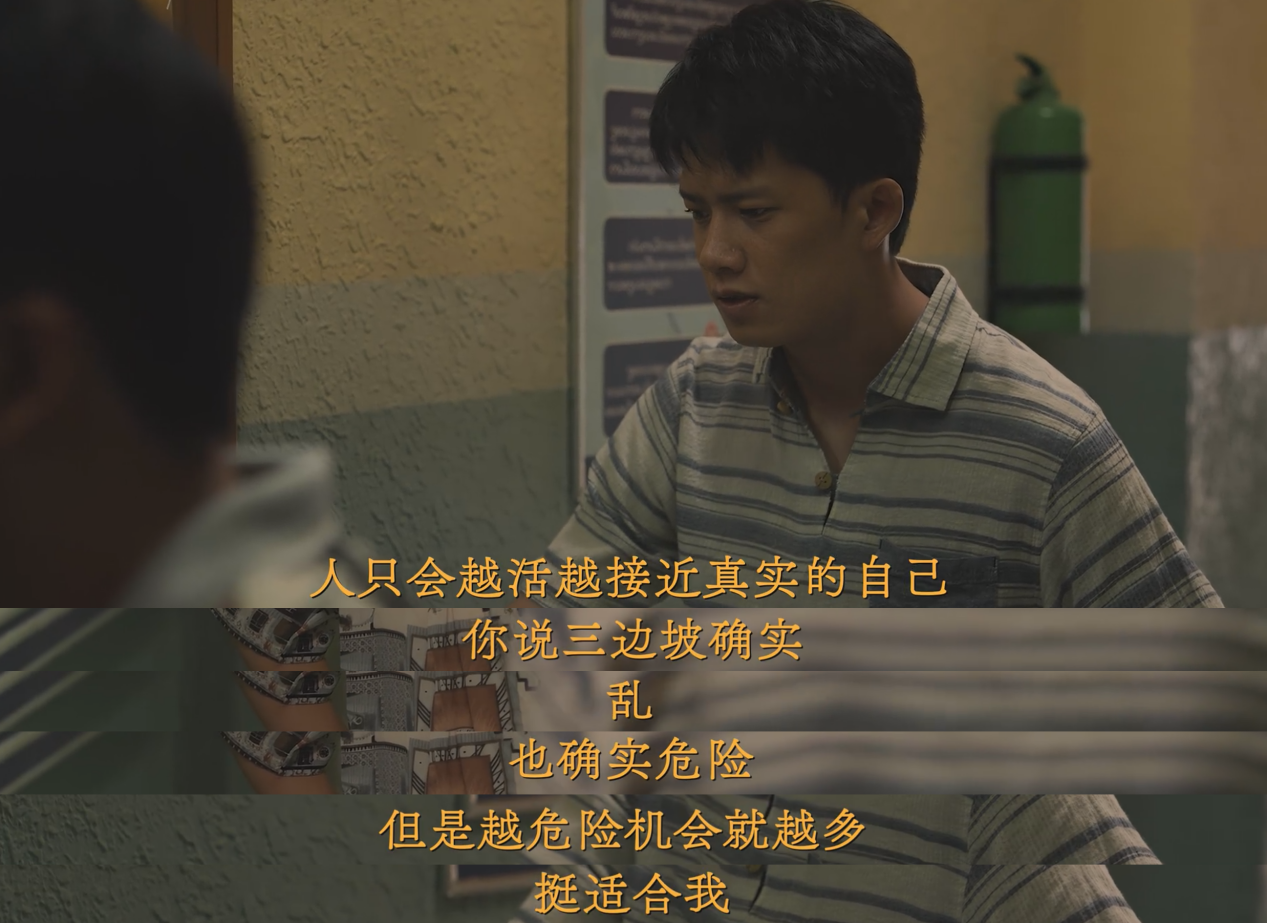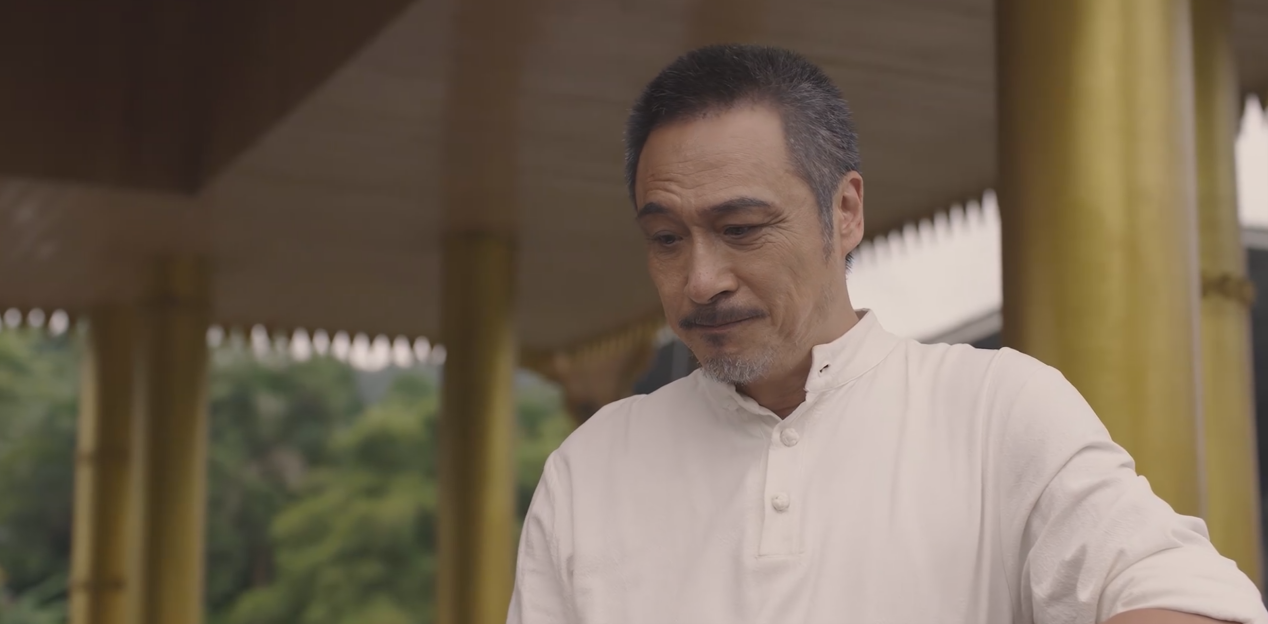
“Border Water Chronicles” starts off somewhat slowly, but the early plot is quite engaging. With the backing of strong reviews, it gradually gained popularity, and its buzz has notably increased. The latter half of the story is somewhat weaker, and while the ending isn't a complete flop, overall it is a fairly watchable mystery drama.

“Border Water Chronicles” poster
To elaborate on how “Border Water Chronicles” attracts its audience, a simple explanation would be that just as “The Missing Her” and “One Last Bet” achieved high box office grosses, “Border Water Chronicles” follows a similar path.
Based on real-life experiences, the original author Shen Xingxing created this memoir-like novel drawing from her own experiences in Myanmar. Although the series sets its backdrop in a fictional Borma Federation and even invents a fictional Borma language, viewers can easily associate the Borma Federation with “Southeast Asia” within domestic film and television productions.

“Border Water Chronicles” book cover by Shen Xingxing
The protagonist Shen Xing (played by Guo Qilin) accidentally finds himself in the Borma Federation’s “Golden Triangle” while searching for his uncle. The “Golden Triangle” in the series can be encapsulated in one word: “lawlessness,” which aligns with Shen Xing's question: Is there no law here?

Shen Xing (played by Guo Qilin)
Practically speaking, there are no laws, making the Golden Triangle essentially a jungle society.
Legal order is nonexistent, with the strong ruling over the weak being the most apparent reality. The “strong” reinforce their positions through monopolization, illegal activities, collusion with political forces, and constant struggles. The weak occupy the bottom of the food chain; they either cling to the strong for protection or continuously struggle to rise.
Resource competition is a daily occurrence in the Golden Triangle. Due to a lack of effective resource allocation mechanisms, the powerful resort to any means necessary to gain and monopolize resources (from timber to minerals) for profit, leading to frequent violent conflicts over disputes.
Morality and justice are both rare and luxurious. In the absence of legal guidance, people's behavioral standards are driven either by self-preservation or by interest. Actions that would be deemed immoral in a normal society might be viewed here as necessary survival tactics. The line between loyalty and betrayal becomes exceedingly blurred, with everyone prepared to sell out or betray others for personal gain.
After his introduction, Mao Pan (played by Xin Haojiang) quickly establishes himself as the most detestable character in “Border Water Chronicles.” A spoiled rich kid, he exhibits traits similar to those of a sociopath, reveling in harming others and considering their lives as insignificant. For example, he forces Old Li to place a king cobra on Shen Xing’s bed, attempting to kill him; when Old Li refuses, he hangs Old Li. He resorts to underhanded tactics, trying to crush Shen Xing with freshly cut logs… Mao Pan embodies individual malevolence and reflects the local state of “lawlessness.”

Mao Pan (played by Xin Haojiang)
Guo Limin (played by Zhao Runan) represents another type of character. Initially, he struggles to survive as a small fry in this complex and perilous environment. Fate is particularly harsh towards him; his mother is gravely ill and in need of substantial funds for surgery, and he himself faces repeated bullying and oppression… Eventually, Guo Limin succumbs to a dark path.

Guo Limin (played by Zhao Runan)
Guo Limin’s transformation into darkness is not instantaneous; it accumulates gradually. This is a somewhat resigned response to the local state of “lawlessness.” In a jungle society where the strong prey on the weak, kindness and justice often do not receive their due rewards. This leads Guo Limin down a misguided path, believing that only by becoming stronger and more ruthless can he protect himself from harm, as he “draws knives against the weaker.”
However, Tuo is one of the most compelling characters in “Border Water Chronicles.” He possesses both resilience and loyalty but also harbors deep-rooted secrets. More importantly, in this lawless place, he is able to maintain his moral ground, showing deep emotions towards his family, brothers, and friends. Unfortunately, it is extremely challenging to be a good person here, with the cost being either one’s conscience or one’s life.

Tuo (played by Jiang Qilin)
Guai Shu (played by Wu Zhenyu), the most calculative character, undoubtedly has a soft side, as exhibited when he ultimately lets Shen Xing go. Yet to establish a foothold and become the boss of the Golden Triangle is unlikely to be done without dirtiness. The question remains whether Guai Shu was involved in drugs earlier and whether he will continue to do so; the answer is likely affirmative.

Guai Shu (played by Wu Zhenyu)
In short, “Border Water Chronicles” repeatedly validates one point through its rich ensemble: in this lawless land, evil proliferates while good struggles to survive.

The corrupted Guo Limin can only succumb to the “decay” around him

Wang Anquan (played by Jiang Qiming) has completely given up on himself in this corrupt environment
In this lawless state, drug trafficking, human trafficking, gambling, and murder have become all too common, providing the audience with a strong sense of curiosity, reinforcing and intensifying the impressions of chaos found in “The Missing Her” and “One Last Bet” about certain regions abroad.
Curiosity is a part of human nature; people are always fascinated by the unknown, the mysterious, and the bizarre. If the story were set domestically, its creative presentation would face certain limitations. To meet this challenge, many narratives choose to use Southeast Asia as a backdrop or create fictionalized worlds.
On one hand, this does not entirely deviate from reality. Some countries or regions outside of China indeed face a range of social issues, such as war, poverty, fraud, drug trafficking, and human trafficking. These issues provide ample material for film and television production, allowing works to touch on broader real-life problems.
On the other hand, the large-scale fictional backdrop can comfortably pass scrutiny while fully satisfying audiences' sense of curiosity. For instance, the lawless jungle state, the extreme presentation of human depravity, brutal murder methods, and eerie sacrificial rituals not only challenge viewers' psychological limits but also deliver strong visual shocks, allowing audiences to feel a tension and thrill unattainable in domestic stories.
Thus, the first layer of appeal in “Border Water Chronicles” resonates with the attractiveness of “The Missing Her” and “One Last Bet”: it reveals how chaotic and frightening that world truly is!

“Border Water Chronicles” still
Accompanying this curiosity is “Border Water Chronicles” stimulation of the audience's fear.
The Golden Triangle depicted in the series is a world filled with threats and unease, where every inch of land radiates danger; its inhabitants live on the edge, ready to confront sudden crises or death. While this might be a far cry from viewers' daily lives, Shen Xing, as a Chinese character, together with the pervasive chaos, bloodshed, and murder, easily immerses the audience in the atmosphere created by the show, generating a palpable sense of fear.
That fear has two directions. Firstly, by placing viewers in an extreme environment, it not only triggers their instinctive fears of the unknown and dangerous but importantly, prompts them to reflect on the root causes behind such a state. The “lawlessness” of the Golden Triangle is not arbitrary; it is the result of systemic failures and corruption. This can inspire audiences to reflect on the relationships between environment, system, and humanity, and whether similar hidden dangers exist in real society.
“Border Water Chronicles” does contain such reflections, though relatively limited, largely due to some flaws in Shen Xing's character design throughout the story. For example, despite being in a jungle society where “lawlessness” prevails, why would Shen Xing still choose to remain there; shouldn't he have a more reasonable motive?

Shen Xing smilingly returns
If it is because some of Shen Xing’s darker human qualities have been triggered, or that he is drawn to an illusion of “lawlessness,” causing him to somewhat lose himself, then the relationship between the harsh environment and bad human nature should be adequately substantiated to prevent Shen Xing from appearing frivolous, greasy, and exaggerated in the latter part of the story. Once Shen Xing's rationale for his actions is lacking, the narrative’s exploration of the relationship between environment and human nature becomes hollow.

Shen Xing tries to persuade Tuo to leave Guai Shu. However, his character seems a bit “split,” appearing superficial. Doesn’t Shen Xing, knowing very well that danger lurks at every corner, realize this? Wasn't he the one who smilingly returned to follow Guai Shu?
The second direction of fear is closely related to “The Missing Her” and “One Last Bet” — to create fear is to alleviate fear, to remind audiences that: we are quite safe.
At the very end of the plot, Tuo and Shen Xing have this exchange.
Tuo says to Shen Xing: “I envy you.”
Shen Xing wonders: “What do you envy about me?”
Tuo replies: “Your good fortune.”
Shen Xing smiles slightly, “Good fortune, me?”
Tuo continues: “You were born in China; how could your life be anything but fortunate?”

“Border Water Chronicles” still
From “The Missing Her” to “Border Water Chronicles,” the chaos and danger of the fictional settings contrast sharply with the stable social order in the domestic context, allowing audiences to experience the thrill induced by fear from a safe distance without worrying about real consequences. This experience not only satisfies viewers’ curiosity about the unknown but also provides an escape from everyday pressures. The alleviation of fear further instills in the audience an appreciation for the safety of their domestic environment, reinforcing their sense of national pride and belonging.
Hence, while “Border Water Chronicles” pushes boundaries, it also embraces a mainstream narrative.
Many people look down on “The Missing Her” and “One Last Bet,” but fairly speaking, crafting a curiosity-driven story that captivates viewers is no simple task. For instance, the “Misty Theatre” once featured a series entitled “Gold Rush,” which addressed this topic earlier but was confusingly executed. “Border Water Chronicles” succeeds in being captivating and keeps viewers engaged, marking a commercial triumph.
Moreover,


